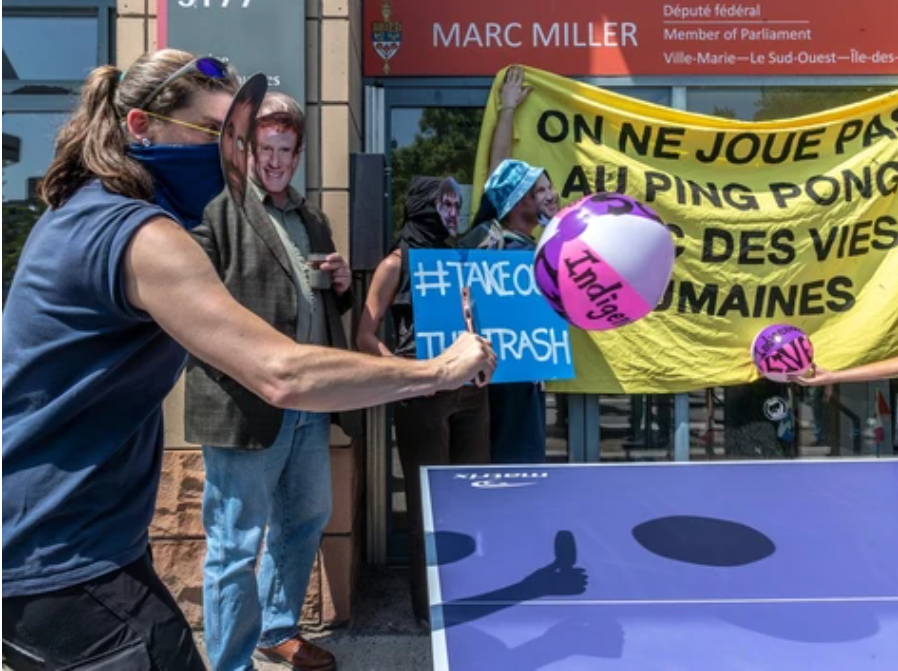The MP brandished a container of gray and opaque water in front of the journalists, demanding a Parliamentary commission concerning the alleged toxic discharges into a watercourse adjacent to the G&R Recycling site at the northwest end of Kanesatake. “If that’s water that we find on the ground in Kanesatake because of an illegal dump that is contaminated, no one wants to live in an environment like that,” the MP said.
Protesters call for inquiry into Kanesatake environmental crisis
A group that claims to speak on behalf of citizens of Kanesatake is calling for an independent commission of inquiry with the participation of the United Nations on the crisis in the Mohawk community of Kanesatake. NDP MP Alexandre Boulerice participated in a demonstration that brought together about 25 people in front of the office of the Crown-Indigenous Relations Minister Marc Miller Tuesday in Montreal. The MP brandished a container of gray and opaque water in front of the journalists, demanding a parliamentary commission concerning the alleged toxic discharges into a watercourse adjacent to the G&R Recycling site at the northwest end of Kanesatake.
Here's how a young First Nations clean water activist is captivating global audiences
Seventeen-year-old Canadian indigenous rights activist and designated "water protector" Autumn Peltier is empowering young people to protect the environment. As the chief water commissioner for Anishinabek Nation, she has spent nearly half her life speaking about the importance of clean water to organizations including the United Nations and the World Economic Forum. Peltier, who grew up in Wiikwemkoong First Nation on Ontario's Manitoulin Island, first became aware of the need for water advocacy at just eight years old. When visiting a neighboring indigenous community, she discovered that they were unable to drink their tap water due to pollution. That kickstarted her career as an activist.
Indigenous youth activist advocating for clean water for all Canadians
After its acclaimed debut at the Toronto International Film Festival in 2020, The Water Walker, which followers the Anishinaabe Indigenous rights advocate Autumn Peltier on a journey to speak in front of the United Nations, has been picked up by HBO Canada and will be available to stream on Crave in April. At only 17, Peltier has over 100,000 Instagram followers and has spoken to prominent world leaders while advocating for safe and easy access to water as a fundamental human right.
Canada falling short on sustainable development goals
Lack of access to safe water is not just a so-called Third World problem. In fact, many First Nations communities in Canada do not have access to safe water. Is Canada failing Indigenous communities when it comes to SDG 6? “I guess it’s more of personal opinion, but yes, I feel there is a long way to go in Canada to achieve SDG 6,” Julie Truelove, head of program development and advocacy at WaterAid Canada, replied. And she emphasized that the SDGs apply to every country in the world, including Canada.
Warriors for clean water
Autumn Peltier knows something about the value of water. The 16-year-old is the Anishinaabe Nation’s chief water commissioner – a “warrior” for clean water – from the Wiikwemkoong Unceded Territory on Manitoulin Island. She became globally recognized when, on World Water Day March 22, 2018, she delivered an impassioned speech to the United Nations in New York. At five feet tall then, Pelletier had to stand on a stool behind the podium to reach the microphone. She spoke softly, but to the point. “No child should grow up not knowing what clean water is,” she said. “We all have a right to this water as we need it – not just rich people, all people.”
Autumn Peltier – Water Warrior gains more recognition
Autumn Peltier of Wiikwemkoong Unceded Territory has been named to the national Clean50 list, which recognizes “outstanding contributions to clean capitalism.” The initiative was created in 2011 by the Delta Management Group, a staffing firm with a focus on ‘green’ initiatives such as cleantech, renewable energy and sustainability.
a talk with a Water Warrior: Autumn Peltier
The Shingwauk Anishinaabe Students Association hosted a talk with Autumn Peltier and her mother Stephanie Peltier, “Our Water, Our Future: A Conversation with Water Defenders.” This talk was in alignment with the Sugar Moon, which is celebrated as the Anishinaabe New Year. This marks the time of year when the sweet water begins to run, and the medicine it produces balances the blood and provides healing.
2 Manitoba grand chiefs highlight long-term boil water advisories on World Water Day
Indigenous people in Manitoba are highlighting the significant role clean water plays in society today — practically and culturally — in honour of World Water Day. The United Nations declared March 22 as World Water Day since 1993. It's a day to focus on the importance of fresh water, and advocating for sustainable development and bringing clean drinking water to more people.
Equity is key to the future of Alberta’s watersheds, experts say
For World Water Day 2021, the United Nations wants us to think about how we value water, and the ways it benefits our lives. If we want to continue to have access to water in all the ways we value, UCalgary experts say that equity needs to be the goal: equitable access to water, equitable opportunities to have a say in the future of our watersheds, and equitable consideration of sustainable approaches.










